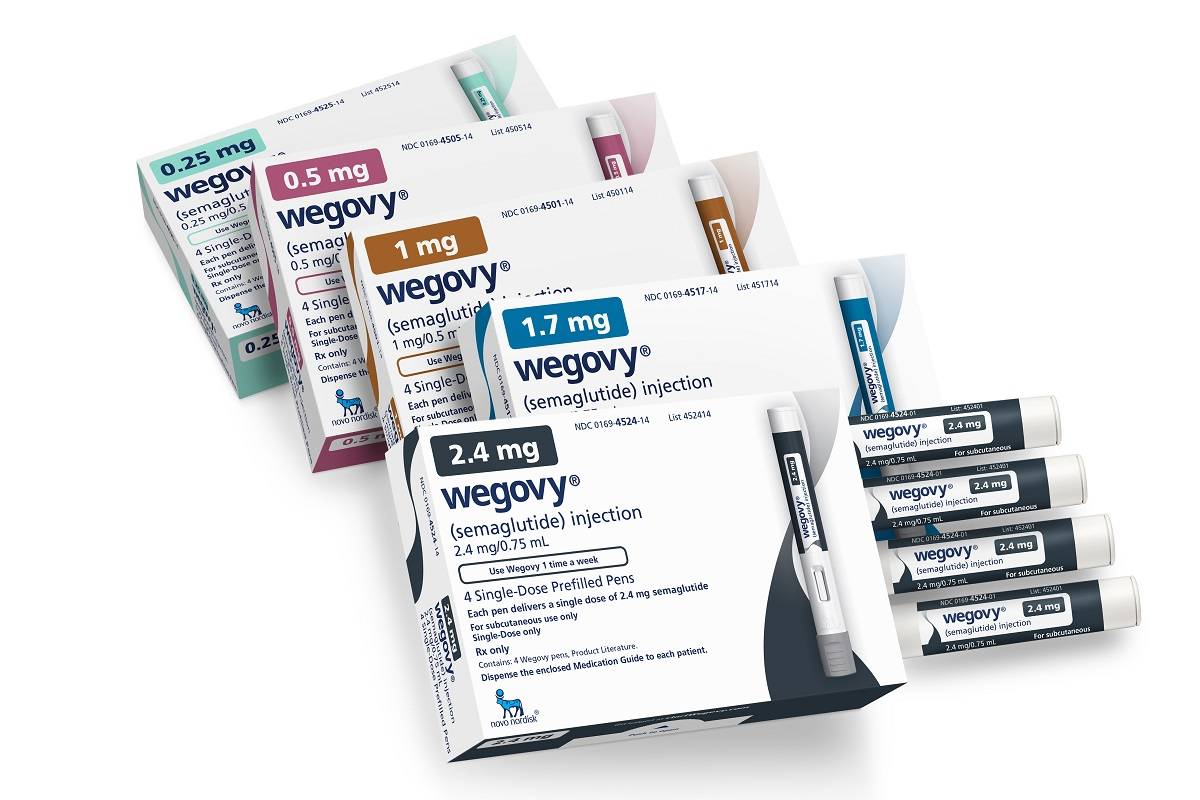
This image provided by Novo Nordisk in January 2023, shows packaging for the company’s Wegovy medication.
15:15 JST, November 12, 2023
The popular weight-loss drug Wegovy reduced the risk of serious heart problems by 20% in a large, international study that experts say could change the way doctors treat certain heart patients.
The research is the first to document that an obesity medication can not only pare pounds, but also safely prevent a heart attack, stroke or a heart-related death in people who already have heart disease — but not diabetes.
The findings could shift perceptions that the new class of obesity drugs are cosmetic treatments and put pressure on health insurers to cover them.
“It moves from a kind of therapy that reduces body weight to a therapy that reduces cardiovascular events,” said Dr. Michael Lincoff, the study’s lead author and a heart expert at the Cleveland Clinic.
Wegovy is a high-dose version of the diabetes treatment Ozempic, which already has been shown to reduce the risk of serious heart problems in people who have diabetes. The new study looked to see if the same was true in those who don’t have that disease.
Experts have known for years that losing weight can improve heart health, but there hasn’t been a safe and effective obesity medication proven to reduce specific risks, said Dr. Francisco Lopez-Jimenez, a heart expert at the Mayo Clinic. He expects the new findings to change treatment guidelines and “dominate the conversation” for years to come.
“This is the population who needs the medicine the most,” said Lopez-Jimenez, who had no role in the study.
In the U.S., there are about 6.6 million people like those tested in the study, experts said.
The results were published Saturday in the New England Journal of Medicine and presented at a medical conference in Philadelphia. Novo Nordisk, the maker of Wegovy and Ozempic, has asked the U.S. Food and Drug Administration to include the heart benefits on Wegovy’s label, like on Ozempic’s.
The new study, paid for by the company, included more than 17,500 people in 41 countries. Participants were age 45 and older, had a body mass index of 27 or higher and were tracked for more than three years on average. They took typical drugs for their heart conditions, but they were also randomly assigned to receive weekly injections of Wegovy or a dummy shot.
The study found that 569, or 6.5%, of those who got the drug versus 701, or 8%, of those who received the dummy shot had a heart attack or stroke or died from a heart-related cause. That’s an overall reduction of 20% in the risk of those outcomes, the researchers reported.
The drop appeared to be fueled primarily by the difference in heart attacks, but the number of serious health complications reported were too small to tell whether the individual outcomes were caused by the drug or by chance.
Study volunteers who took Wegovy lost about 9% of their weight while the placebo group lost less than 1%.
The Wegovy group also saw drops in key markers of heart disease, including inflammation, cholesterol, blood sugars, blood pressure and waist circumference, noted Dr. Martha Gulati, a heart expert at Cedars-Sinai Medical Center in Los Angeles. Changes in those markers began early in the study, before participants lost much weight.
“It means to me that it’s more than just weight loss, how this drug works,” said Gulati, who had no role in what she called a landmark study.
Still, “it remains unclear” how much of the results were a benefit of losing weight or the drug itself, an editorial accompanying the study noted.
About a third of all study volunteers reported serious side effects. About 17% in the Wegovy group and about 8% in the comparison group left the study, mostly because of nausea, vomiting, diarrhea and other stomach-related problems.
Nearly three-quarters of participants were men and nearly 84% were white. Gulati and others said future research needs to include more women and racial and ethnic minorities.
Wegovy is part of a new class of injectable medications for obesity. On Wednesday, the U.S. Food and Drug Administration approved Eli Lilly’s Zepbound, a version of the diabetes drug Mounjaro, for weight control.
Both carry high price tags — monthly costs are about $1,300 for Wegovy and about $1,000 for Zepbound. And both have been in shortage for months, with manufacturers promising to boost supplies.
The medications are often not covered by private health insurance or subject to strict preauthorization requirements. Medicare, the government health plan for older Americans, is prohibited from covering drugs for weight loss alone. But drugmakers and obesity treatment advocates have been pushing for broader coverage, including asking Congress to pass legislation to mandate that Medicare pay for the drugs.
Results from the latest study and others that show the obesity drugs have a direct effect on costly health problems could be a factor in shifting the calculus of coverage, said Dr. Mark McClellan, former chief of the Centers for Medicare and Medicaid Services and the FDA. In 2006, Medicare was allowed to cover weight-loss surgery to treat the complications of severe obesity, if not obesity itself, he noted.
That approach “may end up being relevant here,” he said.
"News Services" POPULAR ARTICLE
-

American Playwright Jeremy O. Harris Arrested in Japan on Alleged Drug Smuggling
-

Japan’s Nikkei Stock Average as JGB Yields, Yen Rise on Rate-Hike Bets
-

Japan’s Nikkei Stock Average Licks Wounds after Selloff Sparked by BOJ Hike Bets (UPDATE 1)
-

Japan’s Nikkei Stock Average Buoyed by Stable Yen; SoftBank’s Slide Caps Gains (UPDATE 1)
-

Japanese Bond Yields Zoom, Stocks Slide as Rate Hike Looms
JN ACCESS RANKING
-

Tokyo Economic Security Forum to Hold Inaugural Meeting Amid Tense Global Environment
-

Keidanren Chairman Yoshinobu Tsutsui Visits Kashiwazaki-Kariwa Nuclear Power Plant; Inspects New Emergency Safety System
-

Imports of Rare Earths from China Facing Delays, May Be Caused by Deterioration of Japan-China Relations
-

University of Tokyo Professor Discusses Japanese Economic Security in Interview Ahead of Forum
-

Japan Pulls out of Vietnam Nuclear Project, Complicating Hanoi’s Power Plans


























